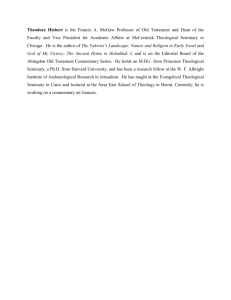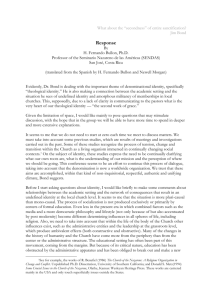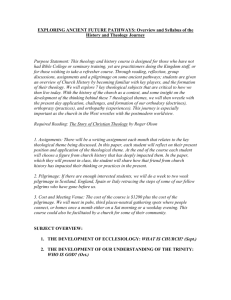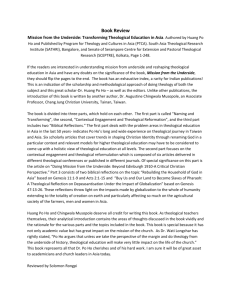Brief: Theological Education on the Web
advertisement
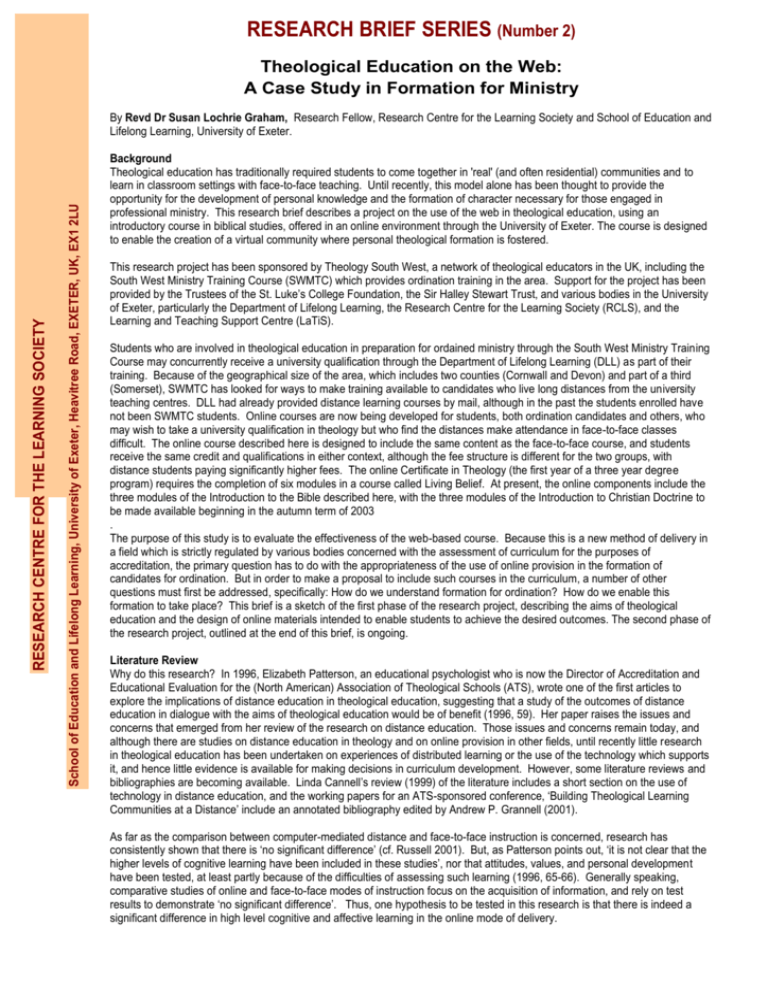
RESEARCH BRIEF SERIES (Number 2) Theological Education on the Web: A Case Study in Formation for Ministry School of Education and Lifelong Learning, University of Exeter, Heavitree Road, EXETER, UK, EX1 2LU RESEARCH CENTRE FOR THE LEARNING SOCIETY By Revd Dr Susan Lochrie Graham, Research Fellow, Research Centre for the Learning Society and School of Education and Lifelong Learning, University of Exeter. Background Theological education has traditionally required students to come together in 'real' (and often residential) communities and to learn in classroom settings with face-to-face teaching. Until recently, this model alone has been thought to provide the opportunity for the development of personal knowledge and the formation of character necessary for those engaged in professional ministry. This research brief describes a project on the use of the web in theological education, using an introductory course in biblical studies, offered in an online environment through the University of Exeter. The course is designed to enable the creation of a virtual community where personal theological formation is fostered. This research project has been sponsored by Theology South West, a network of theological educators in the UK, including the South West Ministry Training Course (SWMTC) which provides ordination training in the area. Support for the project has been provided by the Trustees of the St. Luke’s College Foundation, the Sir Halley Stewart Trust, and various bodies in the University of Exeter, particularly the Department of Lifelong Learning, the Research Centre for the Learning Society (RCLS), and the Learning and Teaching Support Centre (LaTiS). Students who are involved in theological education in preparation for ordained ministry through the South West Ministry Training Course may concurrently receive a university qualification through the Department of Lifelong Learning (DLL) as part of their training. Because of the geographical size of the area, which includes two counties (Cornwall and Devon) and part of a third (Somerset), SWMTC has looked for ways to make training available to candidates who live long distances from the university teaching centres. DLL had already provided distance learning courses by mail, although in the past the students enrolled have not been SWMTC students. Online courses are now being developed for students, both ordination candidates and others, who may wish to take a university qualification in theology but who find the distances make attendance in face-to-face classes difficult. The online course described here is designed to include the same content as the face-to-face course, and students receive the same credit and qualifications in either context, although the fee structure is different for the two groups, with distance students paying significantly higher fees. The online Certificate in Theology (the first year of a three year degree program) requires the completion of six modules in a course called Living Belief. At present, the online components include the three modules of the Introduction to the Bible described here, with the three modules of the Introduction to Christian Doctrine to be made available beginning in the autumn term of 2003 . The purpose of this study is to evaluate the effectiveness of the web-based course. Because this is a new method of delivery in a field which is strictly regulated by various bodies concerned with the assessment of curriculum for the purposes of accreditation, the primary question has to do with the appropriateness of the use of online provision in the formation of candidates for ordination. But in order to make a proposal to include such courses in the curriculum, a number of other questions must first be addressed, specifically: How do we understand formation for ordination? How do we enable this formation to take place? This brief is a sketch of the first phase of the research project, describing the aims of theological education and the design of online materials intended to enable students to achieve the desired outcomes. The second phase of the research project, outlined at the end of this brief, is ongoing. Literature Review Why do this research? In 1996, Elizabeth Patterson, an educational psychologist who is now the Director of Accreditation and Educational Evaluation for the (North American) Association of Theological Schools (ATS), wrote one of the first articles to explore the implications of distance education in theological education, suggesting that a study of the outcomes of distance education in dialogue with the aims of theological education would be of benefit (1996, 59). Her paper raises the issues and concerns that emerged from her review of the research on distance education. Those issues and concerns remain today, and although there are studies on distance education in theology and on online provision in other fields, until recently little research in theological education has been undertaken on experiences of distributed learning or the use of the technology which supports it, and hence little evidence is available for making decisions in curriculum development. However, some literature reviews and bibliographies are becoming available. Linda Cannell’s review (1999) of the literature includes a short section on the use of technology in distance education, and the working papers for an ATS-sponsored conference, ‘Building Theological Learning Communities at a Distance’ include an annotated bibliography edited by Andrew P. Grannell (2001). As far as the comparison between computer-mediated distance and face-to-face instruction is concerned, research has consistently shown that there is ‘no significant difference’ (cf. Russell 2001). But, as Patterson points out, ‘it is not clear that the higher levels of cognitive learning have been included in these studies’, nor that attitudes, values, and personal development have been tested, at least partly because of the difficulties of assessing such learning (1996, 65-66). Generally speaking, comparative studies of online and face-to-face modes of instruction focus on the acquisition of information, and rely on test results to demonstrate ‘no significant difference’. Thus, one hypothesis to be tested in this research is that there is indeed a significant difference in high level cognitive and affective learning in the online mode of delivery. Goals of Theological Education The overall goal of theological education is the development of theological understanding, which ATS defines as ‘an aptitude for theological reflection and wisdom pertaining to responsible life in faith’. This overall goal may be seen as the composite of four goals: Theological learning Spiritual and ministerial formation Practical preparation for ordained ministry Growth in personal maturity Theological learning is defined as the intellectual grasp of the tradition of a faith community, but this is not limited to cognitive knowledge. Theological learning includes personal knowledge, and pays attention to the effect that learning has on the students, and the ways in which it has been integrated in their life and practices. It includes the capacity to engage with different traditions of thought, and the ability to interpret the Christian tradition with and among others, understanding that interpretation is always socially located. From a pedagogical perspective, the intellectual qualities that students need to develop include a clarity of mind that is able to grasp complex issues and to reflect on them with care and depth. The goals of ministerial formation include deepening spiritual awareness, along with growth in moral sensibility and character. In an academic context, this aspect of formation is seen in the students’ developing awareness of self and others, their ability to learn and to enable learning in the groups in which they participate, and the ways in which they develop and maintain relationships of mutuality and respect. The acquisition of the practical skills necessary to the exercise of ministry in a community requires the candidates to prepare themselves to take on the role of public representatives of the faith and the church. In the context of their academic training, this includes the development of the capacity to reflect theologically on both their own experiences and the practices of the church, and requires the understanding of and engagement with ethical, social and practical ideas. It also requires sophisticated leadership abilities based on a collaborative style of working with others. Among the signs of growth in personal maturity are the ability to face change and pressure, to handle different roles and expectations, to grow in the ability to work with others in the exercise of authority and leadership, and to become people with the courage to innovate and to make difficult choices. What we see, again and again, in these goal statements, is that the student is attempting to learn to work in a complex leadership role in a group, where the exercise of authority is defined in terms of mutuality, collaboration, and empowerment; where there are constraints implied by the tradition, although creativity and innovation in facing the future are equally important; and where the task of all is the interpretation of the tradition in the present and the application of that knowledge to new and changing circumstances. There are theological reasons why this should be the case, and although the balance between authority and mutuality, and tradition and creative innovation may differ in different contexts, these competencies are necessary in any case. The aims of the traditional intellectual approach to the academic study of theology often omit personal formational elements. The academic study is considered one part of the three which make up the whole (academic/non-residential, ministerial development/residential, and practical) each with different goals, and bringing them together has proved problematical. However, designing the instruction in one part so that it is characterised by the same goals as the entire enterprise might be one way to bring together the academic and the formational aspects of theological education in a fruitful synthesis (cf. Kelsey 1993). In addition to the learning outcomes specific to the academic study of theology, any course designed in this way would share the qualities of theological education as a whole. Theological Formation in a Virtual Environment The design of the online introductory course in biblical studies aims to enable students working in this domain to develop certain skills as they relate to the domain. These are usually understood as learning outcomes, which are statements of aims in terms of what the students will learn and how they will demonstrate that learning (Gosling and Moon 2001). These outcomes are included in subject specific skills and core academic skills, but competency in theological learning goes beyond this. The general learning outcomes for the online Bible course are outlined in the Syllabus: At the end of the course, we expect that you will have become familiar with the content of the books of the Bible and demonstrated a variety of reading and interpretive strategies for dealing with biblical texts; learned about the major scholarly debates concerning biblical interpretation and begun to develop your own critical stance; begun to acquire the historical critical tools used in biblical interpretation and have demonstrated your abilities in various exegetical exercises; learned to make connections between the biblical and historical materials studied and contemporary life, and shown your ability to do this in discussions. developed the technological and personal skills needed for working in an online environment and demonstrated these skills by successful completion of the modules; begun to reflect on the experience of learning in a 'virtual community' and shown your ability in the use of your Journal. While it is not surprising to find cognitive goals here, including the development of high-level critical skills, the aims also include personal goals, specifically the ability to integrate their studies and their experience, to consciously work at developing relationships with others in their virtual community, and to become self-reflective learners. Thus the course is designed to provide opportunities for transformative learning within the academic study of theology. In this way, it attempts to contribute to the achievement of the goals of theological education. Course Design: Structures and Activities The content of the units in the online course is structured to begin the process of learning and integrating the new knowledge, taking into consideration the conditions specific to this environment. Each unit starts with an overview and a list of learning outcomes, and then asks the student to do some preparatory work. They are asked to do some reading in the primary texts, usually the Bible, and they may be asked to do an exercise, usually one involving the various interpretive skills they are expected to learn. But because one of the aims is that the students will become more aware of the learning process, they also often have to reflect on what they think and feel about the subject at hand before they study it. They use electronic learning journals for this sort of exercise, a tool that provides space for exploring personal issues with the help of the tutor. With this preliminary work complete, they then receive some input from the tutor in the form of lectures. Each unit has four pages which provide abstracts of the lecture and some graphics, along with links to the audio presentation. The audio lecture is divided into brief segments, usually about 5 minutes each, and the pages include a number of tasks which combine interpretive work with personal reflection. After completing the lecture pages (with a total of about 60 minutes of audio material in all), the students move on to the conclusion of the unit, which asks them to participate in several discussions, and to read and reflect further on the subject at hand. Both online and print resources are used. In each of these steps, the focus is on developing the ability to read, analyse, and interpret the biblical materials, and finally to apply what they have learned to contemporary contexts and issues. Thus each unit is designed to provide graded content which builds on the students’ knowledge of the subject area, their familiarity with critical opinions and approaches, their ability to begin to analyse and to interpret from a theological perspective, and their awareness of what and how they are learning and changing. To take a specific example, the unit dealing with the Book of Job includes as an outcome the expectation that students will be able to reflect on the biblical material from a theological perspective. The unit suggests that Job might provide a narrative exploration of the problem of theodicy (the question of evil and God’s justice) and students are asked to reflect in their Journals on God’s role in human suffering. As the Journal is designed to help students develop self-awareness, this first exercise is followed at the end of the unit by another journaling exercise which asks them to evaluate if and how their thinking has changed over the course of the unit, revising the position they had taken at the beginning. Proposed Research Plan Aim: To explore the learning experiences of the online students, in comparison with those of the face-to-face students, in order to indicate How students perceive the online learning experience; What differences there are between the online and face-to-face students in terms of their perceptions of the learning experience; How the online students evaluate their affective learning in particular; To what extent the online mode of delivery is appropriate for formation for ministry, in view of the general goals of theological education. A questionnaire using concepts drawn from the literature on formation in theological education and the standards set by accrediting bodies will be sent to all students registered for credit in the online cohort, and to students in one of the face-to-face groups doing the course. This questionnaire will include open questions designed to elicit comments on the learning experience of the students. The results will be analysed qualitatively but will also provide some quantitative data. The questionnaire will aim to: Describe the learning experiences of the students Indicate motivations for beginning this course of study Identify factors which led students to choose one or the other the mode of delivery Illuminate the process of development of a community of learning Identify examples of transformational learning Evaluate the effectiveness of the online mode of delivery In the lecture sections of the unit, the students are provided with materials for constructing some of the knowledge needed to deal with the problem of theodicy, first in the context of biblical interpretation and then more broadly in the context of personal experience and pastoral relationships. Assessment is formative, primarily by means of online discussion, which in this case includes an online role play. They are also asked to suggest contemporary films which deal with the problem in helpful ways, thus pushing them to interpret another text in terms of what they know about the biblical text. The units frequently use literature and art as a tool for integration (cf. Lamoureux 1999; Reissner 1999; and Todd 2000). In each element of the learning task, the cognitive focus is on developing the ability to read, analyse, and interpret the biblical materials, and to apply what they have learned to contemporary contexts and issues; but the methods require them to work interdependently, and questions of attitudes and values are explicitly explored. The personal development the course attempts to foster is done in a context of the learning community. One of the major difficulties in distance learning, particularly in the correspondence course model, is that the students feel isolated and can become discouraged. This can happen with web-based courses as well, if the model does not include interaction with other students. A primary goal in the online course is the creation of a community of learners, where the learners find opportunities to be leaders and teachers (cf. Palloff and Pratt 1999, 2001). Far more than is typical in the lecture and discussion model of much face-to-face teaching, this model of interdependent learning incorporates a vision of shared work and responsibility in a context which is both anti-hierarchical and antiauthoritarian. It requires students to work together in such a way that the learning of each depends on input from the others in a shared effort. This is tutor directed in the earlier units, but becomes increasingly student directed toward the end of the year, in an attempt to model ‘getting out of the way’, a theme in much writing on student-centered learning (Berling 1998). Working together, students can be exposed to much more of the critical literature than they are able to read on their own, and they learn to take responsibility for their role in the group in enabling others to learn. Anticipated outcomes The study is intended to assess the appropriateness of online provision of theological education, in comparison with the norm, the face-to-face mode. In addition, it will provide a good deal of information about students’ perceptions of the online course and the process of learning, and should enable a re-evaluation of the ‘no significant difference’ findings. It should also generate information on the formational aspects of theological education, particularly how personal growth and change might be fostered explicitly in the curriculum. Students in the online cohort will also be invited to take part in a focus group interview to explore questions and perceptions further, and some individual interviews may also provide more insight into the students’ experience. The development of the modules and the tutoring will take place over the period of one academic year, and the research on the first cohort will be undertaken during the summer following that year. In the second year, a fully revised course will be offered, and further comparative research on the experience of the second cohort will provide more data. The results will be disseminated in conference papers and appropriate academic journals. Conclusion Because a good deal of pressure is now being put on academic institutions to provide online educational opportunities for widening access, this research is timely. The caution of theological educators and their reluctance to depart from traditional patterns of formation is likely to be overwhelmed by institutional desires to increase their market share whether or not the means are appropriate. This study will provide some of the data needed to respond to the questions about the effectiveness of the online provision of theological education. As a result, administrators, curriculum developers, and faculty members will be better able to evaluate the use of this technology in the theological curriculum. References Ascough, Richard S. 2002. Designing for online distance education: Putting pedagogy before technology. Teaching Theology and Religion, 5, no. 1: 17-29. Association of Theoloogical Schools. 1996. “General Institutional Standards.” <http://www.ats.edu>. Berling, J.A. 1998. Getting out of the way: A strategy for engaging students in collaborative learning. Teaching Theology And Religion, 1, no. 1: 31-35. Cannell, Linda. 1999. A review of literature on distance education. Theological Education, 36, no. 1: 1-72. Cormode, Scott. 1999. Using computers in theological education: Rules of thumb. Theological Education, 36, no. 1: 101-15. Gosling, David; Jennifer A. Moon, 2001. How to use learning outcomes and assessment criteria. London: SEEC. Grannell, Andrew P., 2001. “Selected and annotated sources.” In Building theological learning communities at a distance. Working paper, Association of Theological Schools, Pittsburg, PA. Kelsey, David. 1993. Between Athens and Berlin: The theological education debate. Grand Rapids: Eerdmans. Lamoureux, Patricia A. 1999. An integrated approach to theological education. Theological Education, 36, no. 1: 141-56. Larsen, Elena. 2001. CyberFaith: How Americans pursue religion online. Report of the Pew Internet and American Life Project (http://www.pewinternet.org). Le Cornu, Alison. 2001. Is adult theological education through distance learning self-defeating? An exploration of the relationships between truth, authority and self-development. British Journal of Theological Education, 11, no. 2: 9-21. Palloff, Rena M., and Keith Pratt. 1999. Building learning communities in cyberspace: Effective strategies for the online classroom. San Francisco: Jossey-Bass. ———. 2001. Lessons from the cyberspace classroom: Realities of Online teaching. New York: John Wiley & Sons. Patterson, Elizabeth. 1996. The questions of distance education. Theological Education, 33, no. 1: 59-74. Reissner, Anne. 1999. An examination of formational and transformational issues in conducting distance learning. Theological Education, 36, no. 1: 87-100. Russell, T.J., Website. 2001. The 'No Significant Difference' phenomenon. (http://teleeducation.nb.ca/nosignificantdifference/). Todd, Andrew. 2000. What is theological about theological reflection? British Journal of Theological Education, 11, no. 1: 35-45. Young, Jeffrey R. 2002. ‘Hybrid’ teaching seeks to end the divide between traditional and online instruction. Chronicle of Higher Education (http://chronicle.com/weekly/v48/i28/28a03301.htm) 22 March: A33. This is the second issue of this research brief series by The Research Centre for the Learning Society. The Centre is based at the University of Exeter, School of Education and Lifelong Learning. It was established in September 2000 with generous initial funding from the Esmée Fairbairn Charitable Trust and the University of Exeter Foundation. The Centre exists to evaluate, through independent research, the coherence and effectiveness of policies and programmes designed to bring about the ‘Learning Society’. Professor William Richardson, Centre Director (Email: W.B.Richardson@exeter.ac.uk) School of Education and Lifelong Learning Heavitree Road Exeter EX1 2LU Tel: 01392 264917
